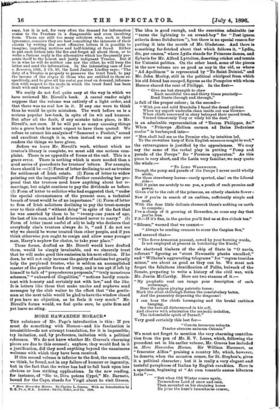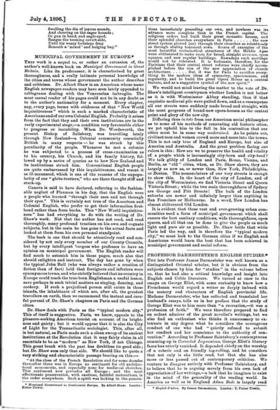MORE HAWARDEN HORACE.* THE substance of Mr. Page's introduction is
this : If you must do something with Horace—and his fascination is irresistible—do not attempt translation, for it is impossible; try imitation, and, by preference, imitation with a political reference. We do not know whether Mr. Graves's charming pieces are due to this counsel ; anyhow, they would find in it a justification, did they need anything beyond the unanimous welcome with which they have been received.
If this second volume is inferior to the first, the reason will, we think, be found, not in any failure of humour or ingenuity, but in the fact that the writer has had to fall back upon less obvious or less striking applications. In the new reading, for instance, of "Sic to, Diva potens Cypri," Mr. Barnato, bound for the Cape, stands for Virgil about to visit Greece.
• More Howarden Horace. By Charles L. Graves. With an Introduction by T. E. ra,e, nt.e. London: Smith, Elder, and Co. 1856. The idea is good enough, and the execution admirable (a, " turns the lightning to an errand-boy" for "Post ignem. zetheria domo Subductum "), but there is no special reason for' putting it into the mouth of Mr. Gladstone. And there is something far-fetched about that which follows it, "Lydia,. dic, par omnes," where Lydia stands for Primrose dames, and Sy bans for Mr. Alfred Lyttelton, deserting cricket and tennis for Unionist politics. On the other hand, some of the pieces in the new volume are as good as any in the old, as where. "Ad Apollinem " is represented by "To Saint Deiniol," and Mr. John Morley, still in the political whirlpool from which, his old friend has escaped, figures as the Pompeii's with whom. Horace shared the rout of Philippi. In the first- " Give me but strength to chew
Each mouthful two-and-thirty times precisely— Read Dante through and through," is full of the proper colour ; in the second-
" With you and mild Mundella I faced the dread cyclone When my superb umbrella clean inside out was blown— When chiefs renowned in story betrayed their sacred trust-, Turned timorously Tory or vilely bit the dust," is an admirable representation of " Tecum Philippos, &a."' When " Princeps dEolium carmen ad 'taloa Deduxisse modos" is burlesqued into- " Men shall hail me as the Premier who, by intuition led,
To the crownless harp of Erin English measures sought to wed,'
the extravagance is justified by the appositeness. We may say the same of the verbal play in putting "Pomp and parade of the Percya" for " Persicos apparatus." As this piece is very short, and the Latin very familiar, we may quote' the whole :—
" To LORD WARKWORTH.
Though the pomp and parade of the Percys I never could wholly
abide, Nor those strawberry leaves—rarely sported, alas! on the Liberal
side— Still it pains me acutely to see you, a youth of such promise andt
power, Given o'er to the cult of the primrose, an utterly obsolete flower
Now if you're in search of an emblem, sufficiently simple and neat,
With the dear little delicate shamrock there's nothing on earth to compete;
I've a clump of it growing at Hawarden, so come any day that you're free.
P.S.—If it's fine, in the garden you'll find us at five o'clock tea."' " Silomo," warned that we cannot- " Always be sending cruisers to scour the Caspian Sea," and assured that-
" The fierce Armenian peasant, cowed by your burning words,. Is not employed at present in butchering the Kurds," the shattered timbers of the ship of State in "0 navio, referent" figuring as "stout Newcastle planks uncalked," and " Wilhelm's aggravating telegrams" for "regnm tumidao. minas," are about as good as they can be. We must nob forget the felicitous identification of Pollio, bulwark of the Senate, preparing to write a history of the civil war, with Mr. Justin McCarthy. Here are two stanzas of it:— " My prophetic soul can image your description of each
scrimmage, Hear the pipers playing patriotic tunes ; Mark the stout shillelagh flatten the constabulary baton, And the peasantry dispersing the dragoons!
I can hear the chiefs haranguing and the brutal carbines
banging, See the hero all distrousered in his cell, And observe with admiration the majestic isolation, The indomitable spirit of Parnell."
Very good certainly this last for-
" Cuncta terrarum subacts
Praeter atrocem animum Catonis."
We must not forget to mention the very charming contribts tion from the pen of Mr. E. V. Lucas, which, following the precedent set in his earlier volume, Mr. Graves has included in Afore Hawarden Horace. Sir William Harcourt, as " fenerator Alfins " praising a country life, which, however, he deserts, when the occasion comes, for St. Stephen's, gives it a political character ; but it is really a very elegant and tasteful paraphrase of Italian by English ruralities, Here is a specimen, beginning at "At cum tortantis anima hibernua
Iovis ":-
"But when Old Winter comes again,, Tremendous Lord of snow and rain, Then mounted on his straining horse- He jo'ns the hunt's ttunultuoma course,. Swelling the din of joyous sounds, And cheering on the eager hounds ; Or gun in hand, and eagle-eyed, Ranges the teeming covert-side, Until his weary footsteps drag Beneath a 'mixed' and bulging bag."











































 Previous page
Previous page